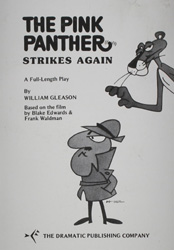 Summary: The comic essence of the marvelous film with all its verbal and visual humor has been captured here in an entirely practical play that is both easy and fun to stage. The world’s most unusual criminologist, Chief Inspector Jacques Clouseau a role originally created by Peter Sellers, fights for his life and for the future of all mankind in the most bizarre and dangerous caper of his brilliantly successful and utterly clumsy career.
Summary: The comic essence of the marvelous film with all its verbal and visual humor has been captured here in an entirely practical play that is both easy and fun to stage. The world’s most unusual criminologist, Chief Inspector Jacques Clouseau a role originally created by Peter Sellers, fights for his life and for the future of all mankind in the most bizarre and dangerous caper of his brilliantly successful and utterly clumsy career.
***********************************************************************
The Pink Panther Strikes Again – A Full-length play, by William Gleason 6.5
When I decided to write up Steve Martin’s soul-sucking reboots of ‘The Pink Panther’, I turned to my local library for comfort. I didn’t want to have to pay to watch them, whether it be through rental or -god forbid- purchase. And so I went looking through the library’s vast collection for anything Pink Panther-related.
This is how I stumbled upon ‘The Inspector‘.
It’s also how I came across this play based on ‘The Pink Panther Strikes Again‘, as authored by William Gleason (with liberal doses of Blake Edwards and Frank Waldman). It’s essentially a re-interpretation of the original film’s plot with additional scenes and dialogues, conceived with the stage in mind.
It was first published in 1981. I have absolutely no idea how popular the play was at the time, and when it was first performed. But I can safely say that, not only is it still available in print through various outlets, but it’s still being performed to this day – as evidenced by the countless listings littering the interwebs.
I’m a HUGE fan of the original film but, to be honest, pictures of the stage version make me cringe. It looks dreadful, like poor community theatre or high school productions. Which, let’s face it, they probably are. It doesn’t help that I have such vivid recollections of the original. And of Peter Sellers.
The basic plot is the same: Former Chief Inspector Dreyfus is about to be released from the insane asylum after three years of therapy, but loses grip with his sanity again when he is visited by Chief Inspector Clouseau. He escapes the asylum, and kidnaps the creator of the Doomsday Machine.
His plan: to hold the world ransom. His price: the death of Jacques Clouseau. But Clouseau is hot on Dreyfus’ trail, unaware that the kidnapping is related to Dreyfus’ escape. But soon Clouseau is not only a target, he is the only one who can stop this madman from destroying the world.
The core plot is where the similarities between the motion picture and the play end. There are numerous changes that affect the tone of the piece, including staging, dialogues, and a few plot devices, transforming the most brilliant entry in the series into a feeble attempt at comedy.
The dialogues, in particular, were problematic. I found myself trying to imagine Sellers saying those lines, and it just didn’t work. For example, Clouseau ends the play with an inspirational message: He knows he’s a bumbling idiot but he persists, he doesn’t let it stop him. So tacky. Yuck, yuck, yuck…
There’s also a ridiculous love story going on between Clouseau and Russian assassin Olga Berriosiva (sic) that finds her struggling between her duty and her love for him. So clichéd. Their dialogues are trite and out of place; it’s stomach churning stuff. She even saves the day at the end. Ick.
Even the staging was off. You have to expect some serious changes when transiting from screen to stage. However, Gleason could easily have kept the bulk of the original while hinting at what took place “off-screen”, at what he cut out. Instead, he opted for changing the scenes, but keeping most of them.
This means that there’s incessant set changes. I read one critique of a recent staging of this play which comments on the awkwardness of having so many changes, how the audience was kept waiting a third of the time. Gleason has instructed how to do this, but I suspect that it works better on paper than in practice.
The way he did this was to introduce a group women dressed as Pink Panthers, who would go and change one set while the actors are performing on another. These Pink Panthers would also interact with the characters at times, albeit infrequently. Frankly I found this notion far too precious.
And sexist.
Most importantly, though: is the play funny? Some of it works. I could imagine Sellers and company enacting it. But I thought that the humour was often too corny, frequently lacking the cleverness that Edwards and Sellers imbued the series with. It fell somewhere between the Steve Martins and Sellers films.
It’s not all bad, but I nearly stopped reading it. I frequently shook my head in dismay and certainly reacted in disgust at some of Gleason’s choices. He would have been better off trying to adapt the first Pink Panther film because it was staged more like a play than a film – requiring little adaptation.
Gleason’s version of ‘The Pink Panther Strikes Again’ fails. It’s amazing to say this, being such a fantastic motion picture, but this play hits all too many wrong notes. By trying to make it its own thing, Gleason unfortunately stripped the play of what made the original so riotously funny: cleverness.
The kind that only mad geniuses like Edwards and Sellers could concoct.
And only together.